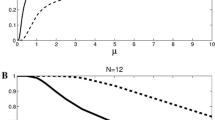Abstract
The analysis is concerned with the characterization of equilibria of a two-stage voting game involving private information acquisition. Rational ignorance and information efficiency are identified. It turns out that information efficiency is not always desirable. By restricting the payoff domain, we are able to characterize completely the set of equilibria. In this case, information acquisition by few voters benefits a majority, or even the whole community. Economic Literature Classification Number D70, D71, D80.
Similar content being viewed by others
References
Bernholz P (1974) On the reasons of the influence of interest groups on political decision-making. Z Wirtschafts- and Sozialwissenschaften 94: 45–63
Austen-Smith D (1990) Information transmission in debate. Amer J Polit Science 34: 124–152
Austen-Smith D, Riker WH (1987) Asymmetric Information and the Coherence of Legislation. Amer Polit Science Rev 81: 897–918
Cohen L (1979) Cyclic sets in multidimensional voting models. J Econ Theory 20: 1–12
Downs A (1957) An Economic Theory of Democracy. Harper and Row, New York
Gersbach H (1992) Allocation of information by majority decisions. J Public Econ 48: 259–268
Gersbach H (1991) The value of public information in majority decisions. Econ Lett 35: 239–242
Gilligan TW, Krehbiel K (1989) Asymmetric information and legislative rules with a heterogeneous committee. Amer J Polit Sci 33: 459–490
Gould JP (1974) Risk, stochastic preference and the value of information. J Econ Theory 8: 64–84
Lohmann S (1994) Information aggregation through costly political action. Amer Econ Rev 84: 518–530
Marshak J, Radner R (1972) Economic Theory of Teams. Yale University Press, New Haven
McKelvey R (1979) General conditions for global intransitivities in formal voting models. Econometrica 47: 1085–1112
Author information
Authors and Affiliations
Additional information
The author would like to thank Peter Bernholz, MartinHellwig, Tilman Börgers, Harald Nedwed and a referee for helpful comments and suggestions.
Rights and permissions
About this article
Cite this article
Gersbach, H. Information efficiency and majority decisions. Soc Choice Welfare 12, 363–370 (1995). https://doi.org/10.1007/BF00186280
Received:
Accepted:
Issue Date:
DOI: https://doi.org/10.1007/BF00186280




